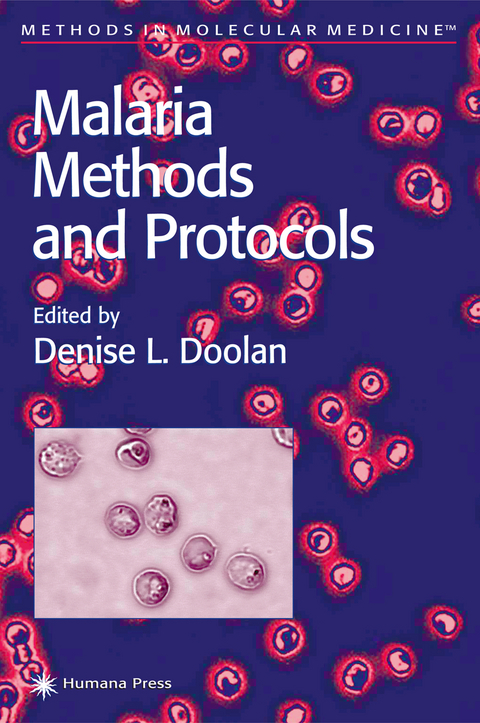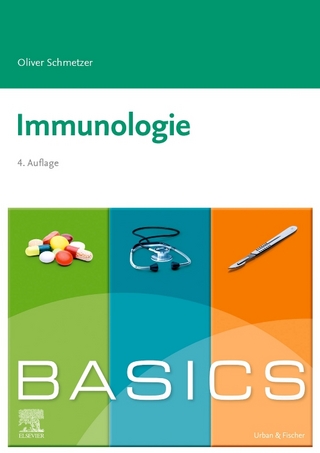
Malaria Methods and Protocols
Humana Press Inc. (Verlag)
978-1-61737-205-6 (ISBN)
Assessing Risk of Infection and Severity of Disease.- Vector Incrimination and Entomological Inoculation Rates.- Epidemiological Measures of Risk of Malaria.- Laboratory Models.- Maintenance of the Plasmodium berghei Life Cycle.- Mouse Models for Pre-Erythrocytic-Stage Malaria.- Mouse Models for Erythrocytic-Stage Malaria.- Nonhuman Primate Models.- Nonhuman Primate Models.- Diagnosis and Typing.- Vector Analysis.- Genotyping of Plasmodium spp..- Genotyping of Plasmodium falciparum.- Microsatellite Analysis in Plasmodium falciparum.- Quantitation of Liver-Stage Parasites by Automated TaqMan® Real-Time PCR.- Quantitation of Liver-Stage Parasites by Competitive RT-PCR.- Molecular Biology Techniques.- Extraction and Purification of Plasmodium Total RNA.- Extraction and Purification of Plasmodium Parasite DNA.- Southern Blotting of Parasite DNA.- SDS-PAGE and Western Blotting of Plasmodium falciparum Proteins.- Nested PCR Analysis of Plasmodium Parasites.- RFLP Analysis.- Analysis of Gene Expression by RT-PCR.- In Situ Detection of RNA in Blood- and Mosquito-Stage Malaria Parasites.- Purification of Chromosomes from Plasmodium falciparum.- Construction of Genomic Libraries from the DNA of Plasmodium Species.- Construction of a Gene Library with Mung Bean Nuclease-Treated Genomic DNA.- Construction of Plasmodium falciparum ? cDNA Libraries.- Production of Stage-Specific Plasmodium falciparum cDNA Libraries Using Subtractive Hybridization.- Construction and Screening of YAC Libraries.- Episomal Transformation of Plasmodium berghei.- Gene Targeting in Plasmodium berghei.- Immunological Techniques.- Peptide Vaccination.- DNA Vaccination.- Assessing Antigen-Specific CD8+ and CD4+ T-Cell Responses in Mice After Immunization with Recombinant Viruses.- Assessing CD4+HelperT-Lymphocyte Responses by Lymphoproliferation.- Limiting Dilution Analysis of Antigen-Specific CD4+ T-Cell Responses in Mice.- Cell Trafficking.- Assessing Antigen-Specific Proliferation and Cytokine Responses Using Flow Cytometry.- Cytokine Analysis by Intracellular Staining.- Assessment of Antigen-Specific CTL- and CD8+-Dependent IFN-? Responses in Mice.- Assessing Antigen-Specific CD8+ CTL Responses in Humans.- Human Antibody Subclass ELISA.- Systemic Nitric Oxide Production in Human Malaria.- Systemic Nitric Oxide Production in Human Malaria.- Cell Biology Techniques.- In Vitro Culture of Plasmodium Parasites.- Automated Synchronization of Plasmodium falciparum Parasites by Culture in a Temperature-Cycling Incubator.- Hepatic Portal Branch Inoculation.- Hepatocyte Perfusion, Isolation, and Culture.- Inhibition of Sporozoite Invasion.- Inhibition of Liver-Stage Development Assay.- T-Cell Mediated Inhibition of Liver-Stage Development Assay.- Antibody-Dependent Cellular Inhibition Assay.- Erythrocytic Malaria Growth or Invasion Inhibition Assays with Emphasis on Suspension Culture GIA.- Analysis of CSA-Binding Parasites and Antiadhesion Antibodies.- Analysis of the Adhesive Properties of Plasmodium falciparum-Infected Red Blood Cells Under Conditions of Flow.- Preparation of Adhesive Targets for Flow-Based Cytoadhesion Assays.- Triton X-114 Phase Partitioning for Antigen Characterization.- Immunoprecipitation for Antigen Localization.- Testing Interventions For Malaria Control.- Field Trials.
| Reihe/Serie | Methods in Molecular Medicine ; 72 |
|---|---|
| Zusatzinfo | XV, 631 p. |
| Verlagsort | Totowa, NJ |
| Sprache | englisch |
| Themenwelt | Medizin / Pharmazie ► Medizinische Fachgebiete |
| Studium ► Querschnittsbereiche ► Infektiologie / Immunologie | |
| ISBN-10 | 1-61737-205-6 / 1617372056 |
| ISBN-13 | 978-1-61737-205-6 / 9781617372056 |
| Zustand | Neuware |
| Haben Sie eine Frage zum Produkt? |
aus dem Bereich


